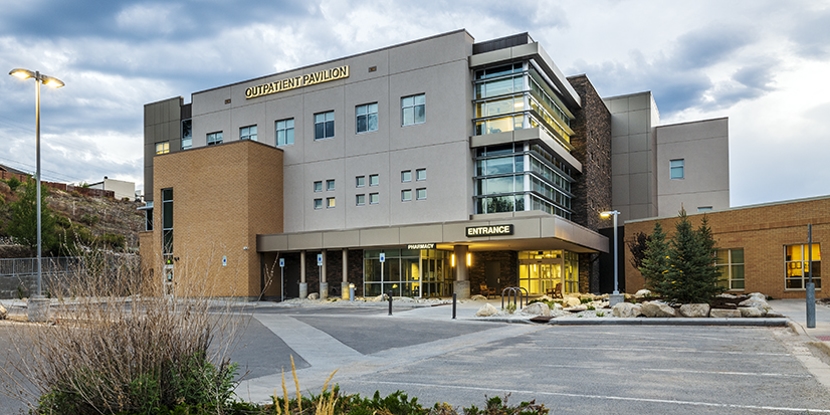Sleep Medicine and Sleep Studies
Please note: The Sleep Medicine clinic has moved to the third floor of the Outpatient Pavilion as of Monday, April 1. The Outpatient Pavilion is located on the HRRMC Main Campus at 1000 Rush Drive.
All patients who have an appointment on or after Monday, April 1 will be seen at the new location.
Lead by Dr. Suzanne Lesage, M.D., along with Dr. Timothy Rummel, M.D., the Sleep Medicine clinic is available to patients suffering from any type of issues regarding sleep.
The collective term "sleep disorder" refers to conditions that affect sleep quality, timing, or duration, and impact a person’s ability to properly function while they are awake. These disorders can contribute to other medical problems.
Common symptoms for those suffering from sleep disorders may include:
- Trouble falling or staying asleep
- Finding it challenging to stay awake during the day
- Imbalances in your circadian rhythm that interfere with a healthy sleep schedule
- Being susceptible to unusual behaviors that disrupt your sleep
Common sleep disorders may include:
Sleep Apnea: Sleep apnea is a common sleep-related breathing disorder that disrupts breathing at night. People with this condition often snore heavily and may wake up choking or gasping for air. There are two types of sleep apnea. Obstructive sleep apnea occurs when tissues in the mouth and throat relax, frequently blocking the upper airway. Central sleep apnea occurs when the brain temporarily stops sending signals to the muscles that control breathing.
If you suffer from chronic sleep apnea and your CPAP (continuous positive airway pressure) machine does not work for you, consider Inspire Sleep Apnea therapy. The Inspire therapy device is a small implant that delivers gentle pulses to your airway muscles to keep your airway open, so you can breathe regularly and sleep soundly.
HRRMC is proud to now offer Inspire therapy to the patients in our community in partnership with Dr. Suzanne Lesage and Dr. Brandon Bentz.
Inspire is for people who:
- Have been diagnosed with moderate-to-severe Obstructive Sleep Apnea, specifically an Apnea-Hypopnea Index (i.e. the number of times they stop breathing each hour) between 15 and 100 (some insurances require < 65)
- Are unable to use or get consistent benefit from CPAP
- Are not significantly overweight
- Are over age 18
Insomnia: Described as a difficulty to fall or remain asleep despite wanting to sleep and having enough time to sleep, on a regular basis. Those with insomnia may experience daytime sleepiness and find it challenging to function while they are awake.
Narcolepsy: Narcolepsy is a sleep disorder that makes people feel excessively tired during the day despite getting an adequate amount of sleep. This can lead to an irrepressible urge to sleep, culminating in “sleep attacks” that typically last for a few minutes. These sleep attacks and other symptoms of narcolepsy are caused by disruptions in the brain’s ability to regulate the sleep-wake cycle.
Restless Legs Syndrome: People with restless legs syndrome (RLS) experience tingling or crawling sensations that create an irresistible urge to move their legs. The sensations and urge to move tend to get worse when sitting or lying down, making it difficult to sleep. RLS is linked with pregnancy, Parkinson’s disease, iron deficiency, and other factors, but the cause of most RLS cases is unknown.
Parasomnias: Parasomnias are a group of unusual sleep behaviors that can occur before falling asleep, during sleep, or in the transition between sleep and wakefulness. Parasomnias are most common in children, but they affect adults as well. They include sleepwalking, bedwetting, night terrors, and more.
Excessive Daytime Sleepiness: It is normal to feel sleepy after a night of sleep loss. But excessive daytime sleepiness (EDS) is a medical term that describes extreme grogginess occurring almost every day for at least three months. EDS makes it difficult or impossible to stay awake during the day. A wide range of medical and psychological conditions can lead to EDS, including sleep apnea, narcolepsy, hypothyroidism, chronic pain, depression, and anxiety.
Source: Examples of disorders via the Sleep Foundation
Sleep Studies
Part of HRRMC's Sleep Medicine program includes sleep studies. If your physician suspects a sleep disorder, they may order an overnight diagnostic sleep study. Located at 7,083 feet above sea level, HRRMC's Sleep Lab is one of the few high-altitude sleep labs in Colorado. Sleep studies at HRRMC are directed by Suzanne Lesage, M.D., a board-certified physician in sleep medicine and neurology.
-
 Suzanne Lesage, MD,MHS
Suzanne Lesage, MD,MHS- HRRMC Antero Pavilion, Sleep Studies, Neurology (Board Certified), Sleep Medicine
- Antero Pavilion
-
 Timothy Rummel, MD
Timothy Rummel, MD- Sleep Medicine (Board Certified), HRRMC Antero Pavilion, Sleep Studies
- Outpatient Pavilion
- 719-530-2000
-
 Corrine L. Size, FNP-BC
Corrine L. Size, FNP-BC- Nurse Practitioner (Board Certified), Ear, Nose & Throat, HRRMC Outpatient Pavilion, Sleep Medicine, Sleep Studies
- Ear, Nose and Throat Clinic
- 719-530-2000
- Accepting New Patients
Dr. Lesage and several specially trained respiratory therapists will conduct this painless, non-invasive test in one of our two sleep labs, which are located in the hospital’s Cardiopulmonary Department. The sleep labs are designed to replicate a comfortable bedroom and each has an adjoining private bathroom.
Sensors will be placed on different parts of your body to measure:
- Brain waves
- Eye and jaw muscle movement
- Heart rate
- Leg movements
- Airflow
- Breathing effort
- Oxygen saturation
Information gathered from the sensors will help determine the type and severity of a sleep disorder. Appropriate treatment options will be discussed following the sleep study.
Watch the how-to video below for tips on setting up your home sleep study.
To make an appointment for a sleep study (with a doctor’s order), please call HRRMC’s Central Scheduling at (719) 530-2396.
Dr. Lesage is available for outpatient consultations at the following location.




